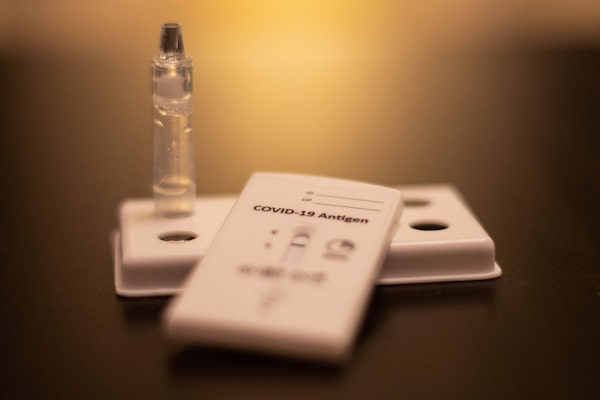
A COVID-19 rapid antigen test kit displayed in Berlin on March 16, 2021.DAVID GANNON/AFP/Getty Images
The Saskatchewan government is shipping 100,000 rapid antigen tests to schools across the province as concerns grow over the number of more infectious COVID-19 strains, particularly in the capital.
Last week, some school divisions in the Regina area announced the restart of online learning after presumed variant cases in the region continued to increase.
Regina Public Schools, the city’s largest division, said Friday that it would start transitioning students to remote classes until after spring break on April 12. Regina Catholic Schools said all its students will learn at home for the week before the break.
The government said in a news release Monday that rapid testing was expected to begin in schools open for in-class learning next week, and that teachers and school staff won’t be expected to administer them.
“The rapid antigen tests use a short nasal swab and can be administered by laypeople who have completed a training program through the Saskatchewan Health Authority lab,” the release said.
“Schools will work with their local medical health officers to determine when testing is appropriate and will work with parents and caregivers to ensure consent is in place.”
A positive test will need to be confirmed by a PCR test, the main way used to screen people for COVID-19, which will be provided by the Saskatchewan Health Authority. A negative test will not need to be confirmed as long as the individual has no symptoms, the government said.
Health Minister Paul Merriman said rapid testing “gives us another tool to monitor school environments and take further steps to protect the health and safety of staff and students if necessary.”
Also Monday, health officials reported 205 new cases of COVID-19 but no new deaths.
They said 141 of the 156 confirmed cases of a variant of concern were in Regina as of Sunday.
There were 1,447 active cases of COVID-19 in the province and there have been 418 deaths since the pandemic began.
The Saskatchewan Party government has so far rejected calls to bring in tougher restrictions to combat spread of the variant. Instead, it has asked older Regina-area residents to stay home and opened a vaccine drive-thru clinic in the city.
Federal COVID-19 data shows Saskatchewan is among the top countrywide in active cases, and leads other provinces and territories in cases in the past seven days.
New modelling suggests Saskatchewan could see more people in intensive care after restrictions around private gatherings were loosened. Earlier this month, the government started allowing a maximum of 10 people to gather in a home.
The Opposition NDP said the situation is “a direct result of (Premier) Scott Moe’s failure to take responsibility.”
“Businesses are being told to stay open while their customers are being urged to stay home. Schools in Regina are closing and surgeries are facing incredible wait times,” NDP Health Critic Vicki Mowat said in a statement.
“It appears case numbers will only increase, adding to the pressure on health-care facilities and hard-working staff.”
She criticized the government for having access to rapid tests for months and not using them for long-term care facilities, high-risk communities and workplaces.
Mowat also noted that the Saskatchewan Party is relying on a tender for private delivery of tests that doesn’t close until the end of April.
“Moe has had several opportunities to act. He has chosen not to do so,” she said.
“He did not bring in a circuit-breaker in November to fight the second wave. And this month, despite knowing that variants of concern were set to cause serious problems in Regina, he chose to relax restrictions instead of taking targeted action to protect the people of Saskatchewan.”
Sign up for the Coronavirus Update newsletter to read the day’s essential coronavirus news, features and explainers written by Globe reporters and editors.